Clinical Neuropsychology Specialty Track
About the track
The Mayo Clinic Neuropsychology Specialty Program provides fellows with a depth and breadth of assessment, educational, consultative, intervention, administrative, and research experiences that result in advanced professional practice competency in clinical neuropsychology.
We offer two full-time tracks, one in adult neuropsychology and the other in pediatric neuropsychology.
We adhere to guidelines proposed by the Joint Task Force of Division 40 of the APA and the Houston Conference on Specialty Education and Training in Clinical Neuropsychology. We offer a major area of study in clinical neuropsychology.
Upon completion of this training specialty, fellows will have an advanced understanding of neuropathologic mechanisms mediating behavioral and cognitive deficits in major categories of neurological disease, a working knowledge of neuropsychological disorders in general medical and psychiatric settings, and will demonstrate intervention skills with neuropsychological disorders. The pediatric neuropsychology specialty is a member of the APPCN. The adult neuropsychology specialty is not a member of the APPCN. Graduates of our program are eligible for board certification in Clinical Neuropsychology by the American Board of Clinical Neuropsychology. Graduates of the pediatric track are additionally eligible for subspecialty board certification in Pediatric Clinical Neuropsychology.
As a Destination Medical Center, Mayo Clinic Rochester sees patients who travel from around the country and world to be seen by our renowned specialists and to participate in research. As a result, fellows are exposed to many unique training opportunities and patient populations. Fellows are able to select clinical cases from those scheduled to best meet their training needs, in consultation with the training director and supervisors.
A broad range of training opportunities are available in neurodegenerative disease, brain injury, stroke, autoimmune/rheumatologic syndromes, epilepsy, neuro-oncology, spinal cord injury, psychiatry, developmental pediatrics, medical genetics and other subspecialties.
There are also clinical opportunities in intraoperative brain mapping, surgical treatment of movement disorders, multidisciplinary clinics and inpatient epilepsy monitoring. Fellows learn efficient report writing skills in a fast-paced environment where the multidisciplinary team relies on our timely feedback.
In addition to close supervision by multiple neuropsychology staff during core clinical rotations, fellows benefit from a highly collaborative teaching environment, learning directly from providers in other disciplines with specialized knowledge in brain-behavior relationships and relevant medical and psychiatric disorders through elective rotations, coursework and didactics.
Research opportunities are plentiful, and fellows can choose a research focus from numerous funded research centers.
Required rotations
Clinical rotations
The principal training site is the Psychometric Assessment Laboratory, which evaluates outpatients referred by Mayo Clinic physicians for neurocognitive evaluations. The majority of neuropsychological assessments are outpatient assessments completed in this clinic. All evaluations are completed with psychometry support.
All neuropsychology fellows will complete neuropsychological assessments within the Psychometric Assessment Laboratory for a minimum of 12 months. Adult neuropsychology fellows will complete 10 or more evaluations that are interpreter-assisted, a one-month rotation in pediatric neuropsychology, and a one-month rotation in the outpatient brain rehabilitation clinic, at a minimum. Pediatric neuropsychology fellows will complete a one-month rotation in adult neuropsychology and a four-month rotation in developmental behavioral pediatrics, at a minimum.
Elective rotations
Fellows showing expected progress toward required competencies may spend up to eight months on elective rotations. You may choose elective rotations in:
- Behavioral neurology
- Deep brain stimulation
- Developmental pediatrics
- Epilepsy service (adult and pediatric)
- Geriatric psychiatry
- Healthy Action to Benefit Independence and Thinking (HABIT) program
- Inpatient general neurology and stroke
- Inpatient physical medicine and rehabilitation (spine service, brain service)
- Inpatient psychiatry
- Neuropathology
- Neuroradiology
- Pain Rehabilitation
- Pediatric hematology and oncology
- Pediatric inpatient consultation-liaison service
- Pediatric neurology
- Physical medicine and rehabilitation
- Sleep medicine
- Speech / language pathology
- One month on the Neuropsychology Service at another Mayo Clinic site (e.g., Florida, Arizona) or Neumors Children’s Hospital
- And others
The Clinical Neuropsychology specialty program is based on the educational guidelines of APA Division 40 and the Houston conference.
Didactics
Didactics include courses in neuroanatomy, neuroscience, clinical neurology and neuroradiology; seminars in clinical neuropsychology and professional development; weekly grand rounds in psychiatry/psychology; and specialty rounds in neurology, including behavioral neurology and pediatric neurology.
Protected research time
Fellows have 1.5 days of dedicated research time per week throughout their fellowship. The Clinical Neuropsychology Specialty Program utilizes a mentorship model. Incoming fellows are matched with a research mentor at the beginning of the fellowship. This model allows for inclusion of fellows in research projects, as well as time in faculty schedules for scholarly mentorship. As a result of this approach, fellows have been successful in achieving multiple peer-reviewed publications, national presentations, and even successful grant applications during the course of their fellowship.
For adult specialty fellows, there is the opportunity to develop research skills in the areas of aging and dementia, neurodegenerative speech and language disorders, remote cognitive assessment, test and normative data development, traumatic brain injury, rehabilitation, cancer, a memory support system for mild cognitive impairment, and more. The Mayo Clinic Study of Aging and Alzheimer’s disease Research Center, the NIDILRR-Funded TBI Model Systems, and the NCI-funded Cancer Center are among Mayo’s multidisciplinary and translational research programs.
Pediatric research opportunities include epilepsy, traumatic brain injury, brain tumors, congenital heart disease, reading disorder, , repetitive and sensory behaviors in autism spectrum disorders, and autism intervention including social skills groups. Fellows have access to a rich clinical database of more than 3,000 pediatric patients seen for neuropsychological assessment. More information can be found in the Department of Psychiatry and Psychology Research Report.
Fellows are supported in submitting two manuscripts for publication and two posters or presentations at national or international meetings during the course of fellowship, and this is a research requirement (presentation travel is covered by Mayo Clinic; see Trip Policy). Research support includes access to SPSS, EndNote, Media Services (poster printing), and statistician and librarian support.
Our fellows often describe the fellowship as a "build your own adventure" fellowship. While there is clear structure and well-delineated requirements, fellows work closely with the training director to shape a tailored fellowship experience that takes advantage of the rich clinical, education and research environment Mayo Clinic has to offer.
Benefits
We offer a competitive salary with excellent administrative and support services.
- Vacation (20 working days per year)
- Comprehensive health insurance
- EPPP study materials and study days; one licensure fee
- ABPP credential review fee
- Generous travel policy (see below)
- Trainees are eligible for one paid education trip (five days) during the course of their training program for attendance at a recognized society meeting, elective course, or workshop with APA CE credit.
- Presentation travel: Trainees are eligible for a maximum of 10 presentation weekdays per academic year, limited to three consecutive days per trip. Trips for presentation of work/research done at Mayo Clinic are in addition to an attendance trip.
Faculty
In addition to caring for patients in their clinical practices, Mayo Clinic's faculty is committed to teaching and facilitating the growth of medical knowledge. Faculty members have published and lectured extensively and are highly regarded in their fields. Fellows have direct access to these individuals throughout the fellowship.
Adult neuropsychology
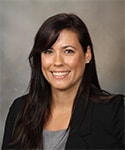 |
Eva Alden, Ph.D., L.P., has research interests in psychometrics, and improving functional outcomes in neurosurgical patients, including epilepsy and neuro-oncology. Her clinical interests include intraoperative monitoring and cognitive mapping during awake brain surgeries. |
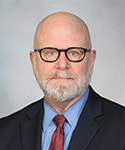 |
Michael Basso, Ph.D., L.P., ABPP, has research interests in the neurocognitive correlates of severe mood disorders and autoimmune disorders, including multiple sclerosis. |
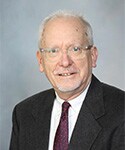 |
Thomas Bergquist, Ph.D., L.P., ABPP, is a consultant in both Physical Medicine and Rehabilitation and Psychiatry and Psychology at Mayo Clinic. His principal research interests include outcomes following brain injury rehabilitation and coping with disability. |
 |
Jane Cerhan, Ph.D., L.P., ABPP, is a supplemental staff member. She has research expertise in psychometrics, medical neuropsychology, cancer and cognition, and cognition as an outcome in clinical trials. |
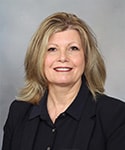 |
Julie Fields, Ph.D., L.P., ABPP, has research interests and expertise in movement disorders (with a focus on deep brain stimulation/ neurosurgical intervention), Lewy body disease, frontotemporal dementia, behavioral interventions in patients/caregivers with mild cognitive impairment and dementia syndromes, and the cognitive health of women. |
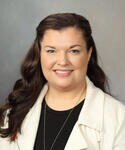 |
Alisha Janssen, Ph.D, L.P., ABPP-RP has research interests in improving post-inpatient rehab outcomes in acquired brain injury patients. Clinical interests are rehabilitation psychology across the treatment spectrum (acute, inpatient and outpatient settings), with particular focus on vocational rehabilitation afer acquired brain injury. |
 |
Jun Min Koay, Psy.D., L.P. has research interests in cognitive and quality-of-life outcomes after neurosurgery, as well as the neuroanatomical correlates of cognition. Clinically, he has a particular interest in pre-surgical evaluations for individuals with brain tumors and epilepsy, as well as intraoperative cognitive mapping. |
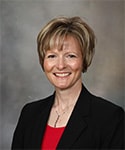 |
Mary Machulda, Ph.D., L.P., ABPP, has research interests in the study of cognitive changes associated with aging and different types of dementia, with a current focus on neuroimaging correlates of empirically defined subtypes of mild cognitive impairment. She also is part of a multidisciplinary research team studying atypical Alzheimer’s disease (posterior cortical atrophy and logogenic aphasia), progressive apraxia of speech, agrammatic aphasia, and semantic dementia. |
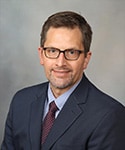 |
Matthew Powell, Ph.D., L.P., ABPP, has research and clinical interests in acquired brain injury, traumatic brain injury, concussion, post-concussion syndrome, and rehabilitation neuropsychology. |
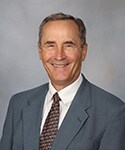 |
Daniel Rohe, Ph.D., L.P., ABPP, has research interests in personality and traumatic spinal cord injury, vocational interests and spinal cord injury, sexuality and disability, substance abuse among those with physical disability, and rehabilitation psychology. |
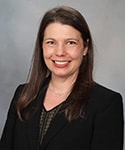 |
Nikki Stricker, Ph.D., L.P., ABPP is the specialty director for the Adult Neuropsychology Fellowship. She has research interests in test development, normative data development, computerized cognitive assessment, psychometrics and diagnostic accuracy of neuropsychological tests, cognition in aging, MCI and dementia, cognitive and biomarker signs of early cognitive impairment in Alzheimer’s disease. |
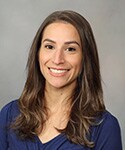 |
Savanna Tierney, Ph.D, L.P., has research and clinical interests in improving functional outcomes for patients with epileptic and nonepileptic events, as well as healthy and atypical aging. She is also interested in developing novel, ecologically valid tasks to assess activities of daily living within these populations. |
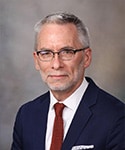 |
Max Trenerry, Ph.D., L.P., ABPP, has a research emphasis on neuropsychological and psychological change after medical events including epilepsy surgery and cardiac surgery. |
Pediatric neuropsychology
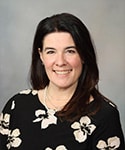 |
Tanya Brown, Ph.D., L.P., ABPP, specializes in brain injury. Her clinical and research interests include assessment, rehabilitation and intervention (behavioral, cognitive) in children and adolescents with neuropsychological deficits stemming from chronic medical or neurological conditions. |
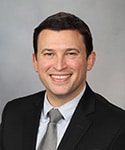 |
Adam Cassidy, Ph.D., ABPP, has research, clinical, and advocacy interests in congenital heart disease (CHD), with a current focus on intervention and the social determinants of neurobehavioral and psychosocial outcomes in children and adolescents with critical CHD. He is also interested in global health, most notably neurodevelopmental outcomes among HIV-exposed/uninfected children in sub-Saharan Africa. |
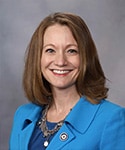 |
Andrea Huebner, Ph.D., L.P., ABPP, is the specialty director for the Pediatric Neuropsychology Fellowship and is on the Board of Directors for the American Board of Clinical Neuropsychology. She specializes in diagnosis and treatment of children with neurodevelopmental disorders including autism. Her research interests include repetitive behaviors and self-injury in children with neurodevelopmental disorders and maximizing functional outcomes in childhood cancer. |
 |
Eric Semmel, Ph.D., L.P., has clinical interests in surgical assessment for patients with epilepsy, including traditional neuropsychological evaluation, functional mapping using stereo-EEG, and awake craniotomy. He is also interested in working in inpatient rehabilitation, including with patients recovering from disorders of consciousness and various acquired brain injuries. Research interests include identifying methods to better predict long-term functional outcomes in these populations; for example, in predicting the risk of functional decline following surgical intervention. |